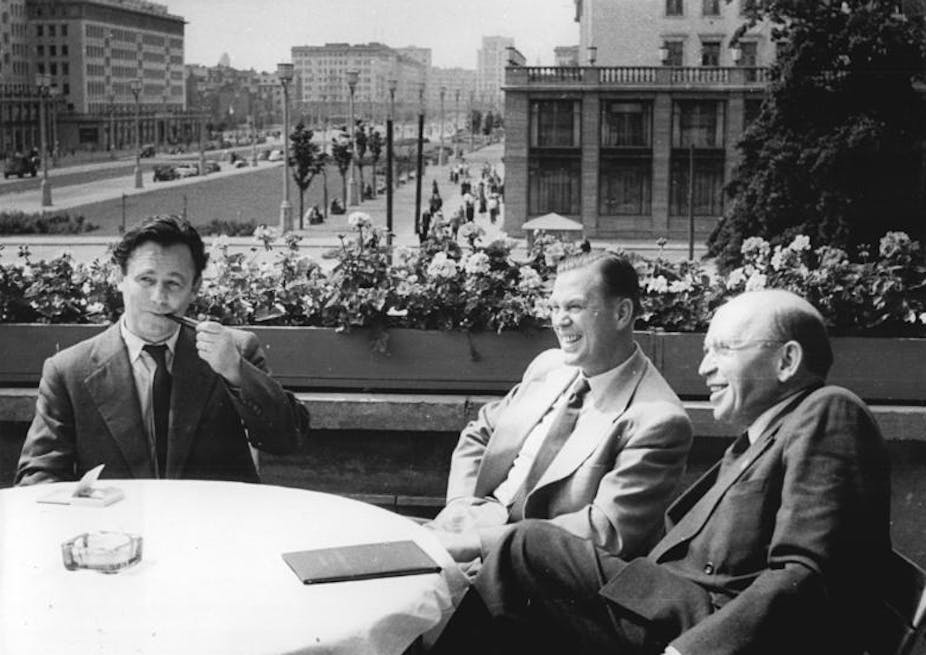Imagine if the director of the American FBI or Britain’s MI5 were to defect to a hostile state. Think of the information such an individual could pass to rival agencies. How would government officials attempt to block, obfuscate and channel ensuing revelations? Then, imagine he or she came back again.
In July 1954, alarm bells rang loudly in Western capitals, when Otto John, the founding director of West Germany’s Federal Office for the Protection of the Constitution (Bundesamt für Verfassungsschutz) – the country’s security agency – defected to East Berlin, and subsequently the Soviet Union.
Otto John’s flight to the Communist East was rooted in the experience of war and his resistance, in stark contrast to most of his countrymen, to Nazism. He had been a spy for Britain during World War II and was involved in the failed attempt to assassinate Hitler on July 20, 1944.
In December 1943, John was a chief auditor for the German airline Lufthansa, a story I narrate in my recent book, Interrogation Nation: Refugees and Spies in Cold War Germany. He had begun supplying British and American intelligence officials with information on German rockets, fighter aircraft and submarines.
Evacuated by British foreign intelligence operatives after the failure of the July 20 plot, British archive sources reveal that John worked for the political intelligence department of the UK foreign office at a secret broadcasting station north of London. John subsequently interrogated German generals and other prisoners of war at Bridgnorth and other locations in England. In 1948, he applied for naturalisation as a British subject. Whether he actually became a dual national is unclear.
Escape to East Berlin
Why did John subsequently betray Britain and West Germany? A strong aversion to the rise of erstwhile Nazis to positions of prominence in the Bonn government appears to have been a motivating factor – though as two German scholars recently concluded, the number of former Nazis in the ranks of John’s agency were limited. The federal government prevaricated about what to do, then offered a half-million Deutschmark reward for information leading to his return. It also pleaded with the American, British and French high commissioners to approach their Soviet counterpart.

Having gone to East Berlin under circumstances that remain unclear, John then spent more than three months in the Soviet Union. Records from the archive of the Stasi – the East German secret police – indicate he supplied answers to queries posed by KGB interrogators about European and North Atlantic security planning.
The return West
In December 1955 John returned to West Germany via West Berlin. The West German supreme court convicted John of treason and sentenced him to four years imprisonment. Sympathy for John led West German president Theodor Heuss to pardon him in July 1958. Documents housed at the Stasi Records Agency show that John’s decision to re-defect took Stasi chief Erich Mielke by surprise, dashing plans to produce a film about his life, an initiative that East German Socialist Unity Party chief Walter Ulbricht had supported in the hope of appealing to “bourgeois” circles in the federal republic.
Files in the UK National Archives yield more interesting facts about the John defections and give a sense why he decided to defect to the East. At issue was what West Germany’s relationship would be with other Western nations, specifically the US, Britain and France. British archival documents show John harboured concerns about extensive surveillance powers that the Western powers were planning to include in a secret memorandum of understanding with West Germany in late 1954.
John mentioned such secret intelligence requirements in conversations when he was in exile in East Berlin. And the West German Chancellor of the period – Konrad Adenauer – also made reference to them.
In his first public comment on John’s flight, West German chancellor Konrad Adenauer categorically denied that he and his closest ministers had kept hidden from the scrutiny of West Germany’s parliament (and thus the media and public) the existence of discussions with the country’s American, British and French occupiers. It now seems this move from Adenauer caused great concern among British officials in Bonn.
What precisely was at stake? Article 3 of the secret memorandum spelled out that West German authorities would be compelled to bring to the immediate attention of Allied intelligence agencies a broad list of “persons of particular interest,” including “Soviet and satellite defectors and deserters, line crossers, former prisoners-of-war, refugees and other repatriates.” These requirements remained in place throughout the Cold War. Some may be with us to this day.
Why John returned to West Germany remains unclear. What we do now know is that his decision to defect for the first time at least in part stemmed from knowledge of these secret clauses which related to arrangements for the European Defence Community, an unsuccessful forerunner to the American-led North Atlantic Treaty Organisation.

